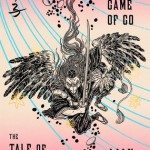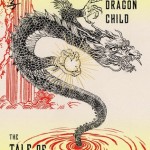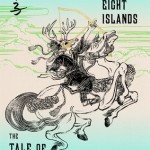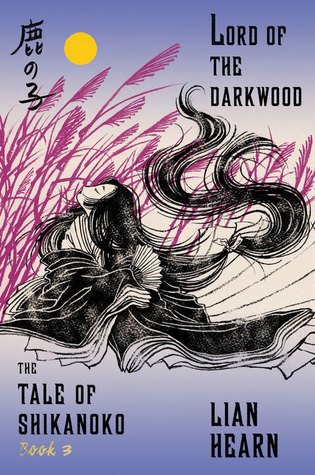 Lord of the Darkwood (Tale of Shikanoko, #3) by Lian Hearn
Lord of the Darkwood (Tale of Shikanoko, #3) by Lian Hearn Formats available: paperback, ebook, audiobook
Pages: 240
Published by FSG Originals on August 9th 2016
Purchasing Info: Author's Website, Publisher's Website, Amazon, Barnes & Noble, Kobo, Bookshop.org
Goodreads
Shikanoko, at what should be a warrior’s hour of greatest triumph, turns his back on those around him, in mourning for a secret love . . .
The Spider Tribe, spurned by their guardian, explore the extent of their powers and ruthless ambitions . . .
Hina, who alone knows the whereabouts of the true emperor, has to forge a new identity of her own. No one must ever know that she is Kiyoyori’s daughter . . .
As the traditional powers navigate weakness and disarray, old spirits and new figures enter the epic battle for the Lotus Throne . . .
In Lord of the Darkwood, the major players of The Tale of Shikanoko are forced to deal with the consequences―expected and unexpected alike―of their past reckless actions. Each of them strives to achieve their destiny, but so far the paths they have followed seem to have done nothing but provoke Heaven’s displeasure.
Profound betrayal, powerful magic, hidden identities, startling violence―these have made the weave of The Tale of Shikanoko so engrossing as it has played out across the sumptuously imagined, beautifully described world of Lian Hearn’s medieval Japan. But the story is now twisting towards its final resolution. Can peace ever come to the Eight Islands?
My Review:
The further I get into the Tale of Shikanoko, the more it reminds me of Tolkien. In Shikanoko, as in The Silmarillion, the reader gets the sense that these are myths and legends of a world that never was, but perhaps should have been. Also, like The Lord of the Rings, it feels as if the Shikanoko is really one large-ish story that was divided into parts for publishing reasons rather than because the stories are actually separate. The endings of each part of this tale don’t even feel as if they are intermediate endings. They feel like pauses for the reader to take a breath before diving back in.
Also, and fair warning, this is not a story that lends itself to putting down and picking up a few days later. An awful lot happens in each part, and the rich denseness of the story makes it compelling, but also a bit difficult to pick up after putting it down for a few days. Leaving this world is always a wrench.
The story in Lord of the Darkwood takes place during Shikanoko’s dark night of the soul. He spends a lot of this story absent, either in mind or in body, while the world goes on around him. And it is not the better for his absence, which is, of course, the point.
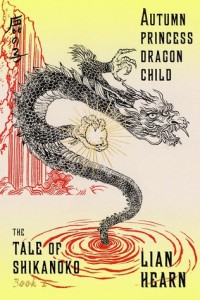 In some ways, there could be said to be three lords of this darkwood. One is Shikanoko – it is his by right of inheritance. Also, as the deer’s child, it is truly his world. He retreats into it to escape from his grief and his despair at the death of the woman he both loved and lost, the Autumn Princess. That story is told in the second book, Autumn Princess, Dragon Child.
In some ways, there could be said to be three lords of this darkwood. One is Shikanoko – it is his by right of inheritance. Also, as the deer’s child, it is truly his world. He retreats into it to escape from his grief and his despair at the death of the woman he both loved and lost, the Autumn Princess. That story is told in the second book, Autumn Princess, Dragon Child.
But his son Kiku is also a lord of the Darkwood. Kiku and his brothers were born through sorcery in the Darkwood, and it is Kiku who seems to have absorbed most of the darkness. In the absence of Shikanoko, his father and mentor, Kiku turns to the dark side of sorcery, and follows the path of one of their other fathers into banditry and crime. He take the place of the King of the Mountain, and begins a criminal invasion of the cities.
Meanwhile, the land is drying up and the people are dying. At the beginning of Shikanoko’s story, his father was killed after playing go with a Tengu, a chaos spirit of the Darkwood. That death set all the events of the story into motion, and led to not only Shikanoko’s disinheritance and exile, but eventually the death of the rightful Emperor. His heir is also in hiding and exile, playing at being an entertainer to hide his identity. But the land knows that the usurper is not the rightful ruler, and the land is cursed until the balance is restored.
The tengu is also a lord of the Darkwood, and he has returned to right the wrong he created all those years ago. But his nature is chaotic, and restoration will not come without sacrifices made by all those who have been caught up in the wrong he committed. Whether things will be put right, or not, is the part of the tale that has yet to be revealed.
Escape Rating A: In spite of life’s interruptions, I absolutely loved this book, and the series as a whole has been magical, lyrical and just plain awesome.
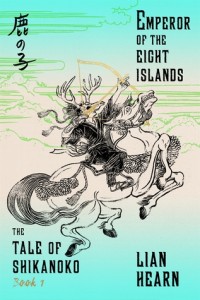 I will say that this book, and this series, are event-driven rather than character-driven. It seems as if events are set in motion back in Emperor of the Eight Islands, and everything that happens after that is a reaction to those events and various attempts to either set things right or avoid one’s fate in setting things right. Everything happens for a purpose, and coincidences abound in order to have a hope of getting the world back on the right track. It’s marvelous but it is different. Characters are, in some way, forces as much as they are individuals, if not more.
I will say that this book, and this series, are event-driven rather than character-driven. It seems as if events are set in motion back in Emperor of the Eight Islands, and everything that happens after that is a reaction to those events and various attempts to either set things right or avoid one’s fate in setting things right. Everything happens for a purpose, and coincidences abound in order to have a hope of getting the world back on the right track. It’s marvelous but it is different. Characters are, in some way, forces as much as they are individuals, if not more.
One other story that the Tale of Shikanoko reminds me of is T.H. White’s Once and Future King, which was a book of Arthurian mythmaking. But unlike in White’s book, where the reader knows who Arthur is all along, at this point in Shikanoko we know who the hidden emperor is, we just don’t have a clue whether events are going to work their way around to him actually becoming emperor. It’s also fascinating that Arthur’s learning process in White’s book is scattered among multiple characters in this one.
The tengu sees the world as a vast game of Go. This feels like an important concept in the book and may be a metaphor for the story. The thing about Go, or any game, is that one of the players wins and one loses. If this tengu loses this game, it’s going to be pretty devastating for the people involved. At the same time, the player may not take the game seriously because it is a game.
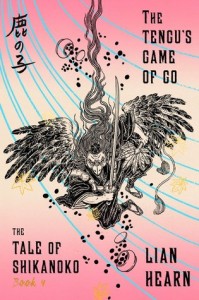 I don’t think it’s a coincidence at all that the final book is titled The Tengu’s Game of Go. Because the whole story is.
I don’t think it’s a coincidence at all that the final book is titled The Tengu’s Game of Go. Because the whole story is.









